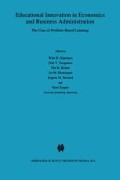Abstract
The quantitative methods mathematics, statistics and computer science invariably take the position of subsidiary yet essential courses in the studies of economics and management sciences. When designing the problem-based curriculum of our faculty, we posed ourselves the following two questions:
-
is problem-based learning as an educational system suited to teach mathematics and statistics; if not, can it be modified into an educational system which preserves most of the principles and objectives of problem-based learning, yet which is adequate to teach these subjects?
-
how can mathematics, statistics and computer science play a role in the educational system of problem-based learning by supplying the students with additional techniques for problem solving, which the students in turn can use in their other courses?
Access this chapter
Tax calculation will be finalised at checkout
Purchases are for personal use only
Preview
Unable to display preview. Download preview PDF.
References
Argyris, C. (1985). Strategy, Change, and Defensive Routines Boston.
Cobb, G. W. (1987). Introductory Textbooks: A Framework for Evaluation. Journal of the American Statistical Association, 82, 321–339.
Richmond, Barry (1993). Systems Thinking: Critical Thinking Skills for the 1990s and beyond. System Dynamics Review, 9 (2), 113–134.
Roberts, H. V. (1987). Data Analysis for Managers. The American Statistician, 41 (4), 270278.
Sterman, John D. (1994). Learning in and about complex systems. System Dynamics Review, 10 (2–3), 291–330.
Wijnen, Wijnand (1990). The Importance of Learning in Relation to Teaching. In Van der Vleuten, C. P. M. & Wijnen, W. (Eds.), Problem-based learning: Perspectives from the Maastricht experience. Amsterdam: Thesis Publishers.
Wild, C. J. (1994). Embracing the “Wider View” of Statistics. The American Statistician, may, 48 (2), 163–171.
Author information
Authors and Affiliations
Editor information
Editors and Affiliations
Rights and permissions
Copyright information
© 1995 Springer Science+Business Media Dordrecht
About this chapter
Cite this chapter
Tempelaar, D., Schenk, E. (1995). Quantitative Methods In A Problem-Based Curriculum. In: Gijselaers, W.H., Tempelaar, D.T., Keizer, P.K., Blommaert, J.M., Bernard, E.M., Kasper, H. (eds) Educational Innovation in Economics and Business Administration. Educational Innovation in Economics and Business, vol 1. Springer, Dordrecht. https://doi.org/10.1007/978-94-015-8545-3_23
Download citation
DOI: https://doi.org/10.1007/978-94-015-8545-3_23
Publisher Name: Springer, Dordrecht
Print ISBN: 978-90-481-4504-1
Online ISBN: 978-94-015-8545-3
eBook Packages: Springer Book Archive

